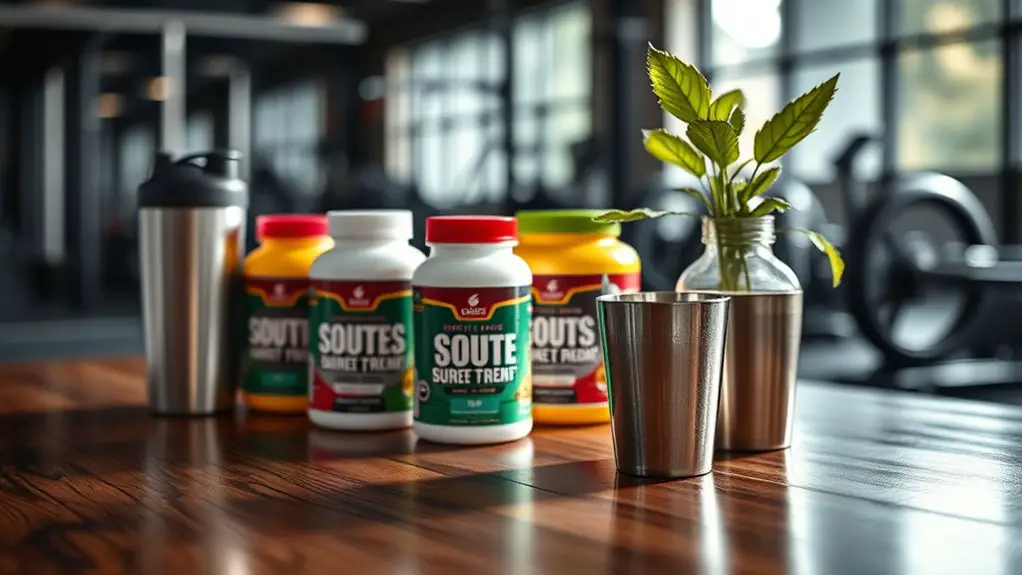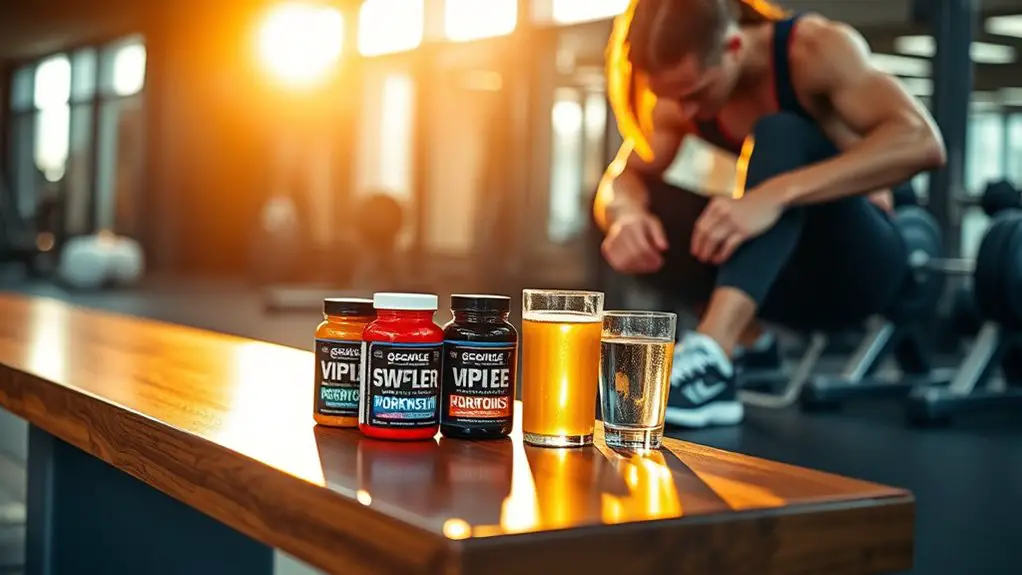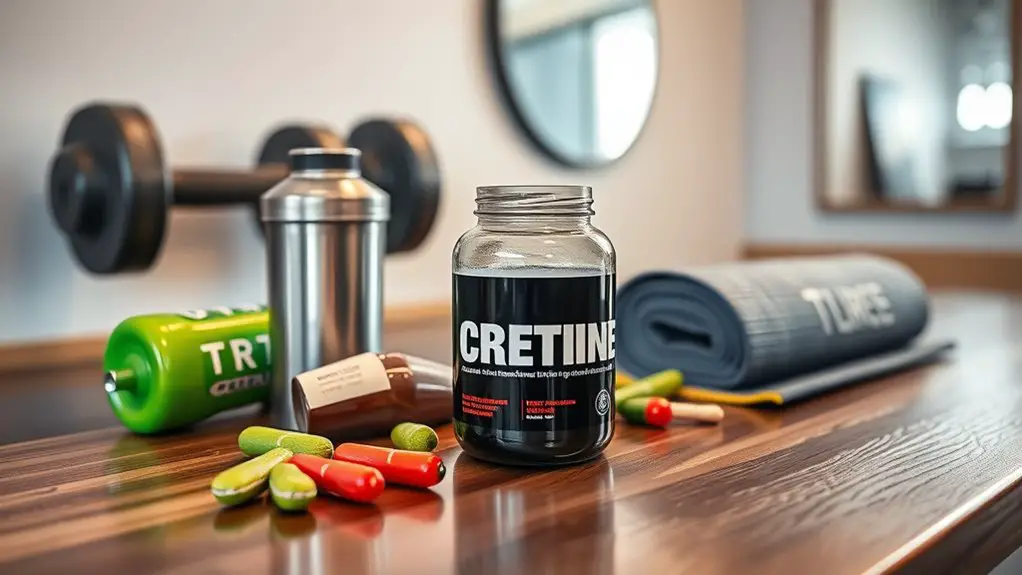The Best Supplements for Gym Performance and Recovery

To maximize your gym performance and recovery, consider using pre-workout supplements for an energy boost, protein powders for muscle recovery, and creatine to enhance strength. Adding BCAAs can help reduce muscle soreness, while omega-3 fatty acids support joint health and overall recovery. Timing and dosage matter, so pay attention to when and how much you take. Each supplement plays a unique role in your fitness journey, and there’s more to explore about their benefits.
Pre-Workout Supplements for Enhanced Energy

When you’re gearing up for a workout, pre-workout supplements can be a game changer, as they’re designed to boost your energy levels and enhance your performance. One of the key ingredients in many pre-workouts is caffeine, a well-researched stimulant. It’s found in various caffeine sources, like coffee, tea, and specific supplements. Consuming caffeine about 30-60 minutes before exercising can improve focus and delay fatigue, helping you push through those last challenging reps.
However, timing is essential when it comes to energy. Taking your pre-workout too early or too late can diminish its effectiveness. Aim for a proper window to maximize your energy levels when you need them most. Additionally, consider other ingredients like beta-alanine or citrulline malate, which can enhance endurance and reduce muscle fatigue. By strategically using pre-workout supplements, you can greatly elevate your gym performance.
Protein Powders for Muscle Recovery
Protein powders play an essential role in muscle recovery after intense workouts. They provide the necessary building blocks for muscle repair and growth. Two popular types are whey protein and plant-based protein. Whey protein is quickly absorbed and ideal for post-workout recovery, while plant-based protein offers a great alternative for those with dietary restrictions.
Here’s a quick comparison of these protein types:
| Protein Type | Benefits | Ideal For |
|---|---|---|
| Whey Protein | Fast absorption, muscle gain | Post-workout recovery |
| Plant-Based Protein | Digestive health, allergen-free | Vegans, lactose intolerant |
| Blend | Combines benefits, versatile | General fitness lovers |
Incorporating protein powders into your routine can greatly enhance muscle recovery, helping you bounce back faster and stay on track with your fitness goals. Choose the right type for your needs, and you’ll be well on your way to peak performance.
Creatine for Improved Strength and Endurance

Although many athletes focus on diet and training, incorporating creatine into your supplement regimen can greatly enhance both strength and endurance. Creatine is a naturally occurring compound found in foods like red meat and fish, making these your primary creatine sources. Supplementing with creatine can increase muscle phosphocreatine stores, allowing for quicker energy production during high-intensity workouts.
To maximize its benefits, pay attention to creatine timing. Taking creatine post-workout can enhance recovery and muscle growth, while pre-workout supplementation may improve performance during your training session. A common approach is to start with a loading phase of 20 grams per day for five to seven days, followed by a maintenance dose of 3 to 5 grams daily.
BCAAs for Reduced Muscle Soreness
After maximizing your strength and endurance with creatine, it’s time to contemplate how branched-chain amino acids (BCAAs) can support your recovery. Research suggests that BCAAs, particularly leucine, isoleucine, and valine, play a significant role in reducing muscle soreness post-workout. By incorporating effective BCAA dosage strategies—typically around 5 to 10 grams before and after your workouts—you can enhance your recovery process.
BCAA timing effects are essential too; consuming them before exercise can help decrease soreness and muscle damage during intense sessions. Studies indicate that taking BCAAs after your workout can further support muscle repair and growth. So, if you’re looking to minimize post-exercise discomfort and bounce back faster, integrating BCAAs into your routine might be a game-changer. Remember to pair them with a balanced diet for ideal results.
Omega-3 Fatty Acids for Joint Health and Recovery

When you’re pushing your limits in the gym, you might overlook the importance of joint health, but omega-3 fatty acids can be a crucial ally in your recovery process. These essential fats, found in fish oil and certain plant sources, offer significant omega benefits, particularly when it comes to reducing joint inflammation.
Research shows that omega-3s help lower levels of inflammatory markers in the body, which can lead to less soreness and stiffness post-workout. Incorporating omega-3 supplements into your regimen may enhance mobility, allowing you to train harder and recover faster.
To maximize these benefits, aim for a daily intake that aligns with your activity level—typically around 1,000 to 3,000 mg. As you focus on your workouts, don’t forget that supporting your joints with omega-3s can make a meaningful difference in your overall performance and recovery. Prioritize your joint health, and your body will thank you!
Frequently Asked Questions
What Is the Best Time to Take Supplements for Optimal Results?
Timing’s vital when it comes to supplements. You wouldn’t fuel your car after it runs out of gas, right? Similarly, pre workout timing is key for energy and performance. Taking them before your session can enhance your results. On the flip side, post workout recovery supplements are essential for muscle repair and growth. Aim to take them within 30 minutes after your workout to maximize benefits and support your body’s recovery process effectively.
Are There Any Side Effects Associated With These Supplements?
Yes, there can be side effects associated with supplements, and it’s essential to be aware of potential supplement interactions. For instance, some supplements might cause gastrointestinal issues, headaches, or allergic reactions. Additionally, combining certain supplements can lead to unexpected effects, affecting how your body absorbs them. Always consult a healthcare professional before starting any new supplement regimen to ascertain it’s safe and suitable for your individual needs and goals.
Can I Combine Different Supplements Safely?
Yes, you can combine different supplements safely, but it’s important to take into account stacking supplements carefully. Some ingredients may interact negatively, leading to side effects or reduced effectiveness. Always check the labels and research ingredient interactions before mixing. Consulting a healthcare professional can help guarantee you’re making safe choices. Ultimately, listen to your body and monitor how you feel after taking any combinations, adjusting as needed for best results.
How Do I Determine the Right Dosage for My Needs?
Determining the right dosage for your needs is like maneuvering through a maze—complex but achievable! Start by evaluating your individual needs, considering factors like weight, activity level, and health goals. Then, use dosage calculations based on reliable sources or consult a healthcare professional. Always begin with the lowest effective dose, gradually adjusting as needed. This approach guarantees you’re optimizing benefits while minimizing risks, making your journey to fitness safer and more effective.
Are Supplements Necessary if I Have a Balanced Diet?
You might think supplements are unnecessary if you have a balanced diet, and that’s a common myth. While a well-rounded diet often provides essential nutrients, some individuals may still lack certain vitamins or minerals due to various factors like age, activity level, or dietary restrictions. It’s vital to assess your unique needs. Consulting a healthcare professional can help determine if supplements could effectively fill any nutritional gaps in your balanced diet.





